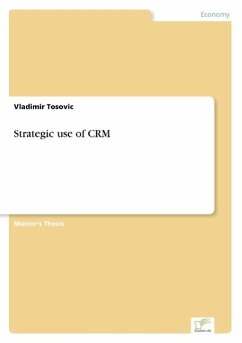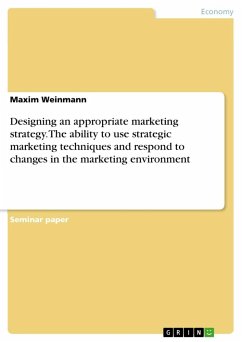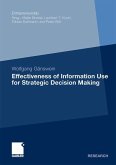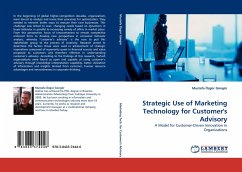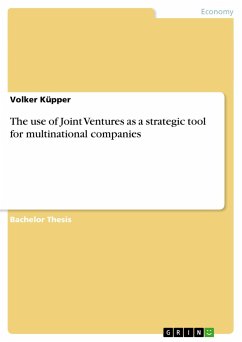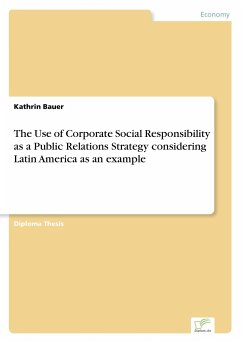Master's Thesis from the year 2001 in the subject Business economics - Business Management, Corporate Governance, grade: 2,1, Maastricht School of Management (E-Business), language: English, abstract: Inhaltsangabe:Abstract:
CRM is a buzzword nowadays. This catchphrase has become the revenue driver for the consultants and a nightmare for the people responsible for its implementation. Although this topic receives broad media attention, the presented strategic CRM issues are very fuzzy. Attracted by the enormous revenue potential, there is a vast of CRM experts giving tips on the CRM strategies, which results in a very unclear and even contrary coverage of this subject. The companies feel that they need CRM, but as soon as they try to find out what that is and how could it be beneficial for their business, they get very diverse and vague answers. This work will seek to provide a consistent picture of CRM strategy and the underlying technology
The focus of this paper is to offer a critical analysis of different strategic CRM concepts and integrate them into one CRM framework. As CRM is made possible by the technology developments, the understanding of opportunities provided by the underlying technology is necessary. Therefore the center of attention will be in the explanation of the interaction between the customer oriented strategy and the enabling technology.
In order to uncover the essence of CRM, this paper will provide a look at the roots of CRM. It will explain the theoretical background of CRM and the new market challenges, which have been pushing the development of the CRM concept. Also the relationship between the customer satisfaction and the customer profitability must be evaluated, as satisfied customers is one of the main intentions of CRM.
I want also to approach some practical issues of CRM. This study will seek to outline the findings about the bottom line impact of CRM and the issues on the accessibility of the customer information.
Finally, with the last chapter I will try to close with useful recommendations regarding CRM strategy development and provide a conclusion on the results achieved in this work.
Inhaltsverzeichnis:Table of Contents:
List of Abbreviations
CHAPTER 1
1.1Introduction1
1.2Problem Definition2
1.3Objectives of the study2
1.4Relevance of the study3
1.5Research methodology3
1.6Limitations of study3
CHAPTER 2 -The new challenges
2.1Changing customers5
2.2Theoretical background of CRM6
2.2.1The marketing paradigm shift6
2.2.2Relationship marketing7
2.2.3One-to-one marketing8
2.2.4Critics on relationship marketing9
2.2.5The new marketing model10
2.3Customer satisfaction and profitability10
2.3.2Identifying profitable customers12
2.4Increasing demands on the companies14
2.5CRM - a way out?15
CHAPTER 3 - CRM
3.1Definition of customer relationship management16
3.1.1Strategic definition16
3.1.2CRM as technology17
3.1.3How companies see CRM?18
3.1.4Related definitions18
3.2Introduction to CRM19
3.2.1CRM driving forces19
3.2.2CRM benefits20
3.3Strategic CRM framework21
3.3.1Strategic goals of CRM22
3.3.2CRM strategy24
3.3.3CRM value chain25
3.3.4Strategic framework for CRM28
3.3.5Conclusion on CRM strategy37
3.4Technology enabler37
3.4.1CRM technology overview39
3.4.2CRM software solutions41
3.5Outsourcing (ASP)47
CHAPTER 4 - CRM at work
4.1When is CRM required?49
4.1.1Costs of CRM implementatio49
4.1.2Financial benefits of CRM systems50
4.1.3Implement or not?52
4.2CRM implementation53
4.3Internet privacy53
4.4CRM outlook55
CHAPTER 5 - Recommendations and conclusion
5.1Recommendations57
5.2Conclusion59
References
Appendices
Hinweis: Dieser Artikel kann nur an eine deutsche Lieferadresse ausgeliefert werden.
CRM is a buzzword nowadays. This catchphrase has become the revenue driver for the consultants and a nightmare for the people responsible for its implementation. Although this topic receives broad media attention, the presented strategic CRM issues are very fuzzy. Attracted by the enormous revenue potential, there is a vast of CRM experts giving tips on the CRM strategies, which results in a very unclear and even contrary coverage of this subject. The companies feel that they need CRM, but as soon as they try to find out what that is and how could it be beneficial for their business, they get very diverse and vague answers. This work will seek to provide a consistent picture of CRM strategy and the underlying technology
The focus of this paper is to offer a critical analysis of different strategic CRM concepts and integrate them into one CRM framework. As CRM is made possible by the technology developments, the understanding of opportunities provided by the underlying technology is necessary. Therefore the center of attention will be in the explanation of the interaction between the customer oriented strategy and the enabling technology.
In order to uncover the essence of CRM, this paper will provide a look at the roots of CRM. It will explain the theoretical background of CRM and the new market challenges, which have been pushing the development of the CRM concept. Also the relationship between the customer satisfaction and the customer profitability must be evaluated, as satisfied customers is one of the main intentions of CRM.
I want also to approach some practical issues of CRM. This study will seek to outline the findings about the bottom line impact of CRM and the issues on the accessibility of the customer information.
Finally, with the last chapter I will try to close with useful recommendations regarding CRM strategy development and provide a conclusion on the results achieved in this work.
Inhaltsverzeichnis:Table of Contents:
List of Abbreviations
CHAPTER 1
1.1Introduction1
1.2Problem Definition2
1.3Objectives of the study2
1.4Relevance of the study3
1.5Research methodology3
1.6Limitations of study3
CHAPTER 2 -The new challenges
2.1Changing customers5
2.2Theoretical background of CRM6
2.2.1The marketing paradigm shift6
2.2.2Relationship marketing7
2.2.3One-to-one marketing8
2.2.4Critics on relationship marketing9
2.2.5The new marketing model10
2.3Customer satisfaction and profitability10
2.3.2Identifying profitable customers12
2.4Increasing demands on the companies14
2.5CRM - a way out?15
CHAPTER 3 - CRM
3.1Definition of customer relationship management16
3.1.1Strategic definition16
3.1.2CRM as technology17
3.1.3How companies see CRM?18
3.1.4Related definitions18
3.2Introduction to CRM19
3.2.1CRM driving forces19
3.2.2CRM benefits20
3.3Strategic CRM framework21
3.3.1Strategic goals of CRM22
3.3.2CRM strategy24
3.3.3CRM value chain25
3.3.4Strategic framework for CRM28
3.3.5Conclusion on CRM strategy37
3.4Technology enabler37
3.4.1CRM technology overview39
3.4.2CRM software solutions41
3.5Outsourcing (ASP)47
CHAPTER 4 - CRM at work
4.1When is CRM required?49
4.1.1Costs of CRM implementatio49
4.1.2Financial benefits of CRM systems50
4.1.3Implement or not?52
4.2CRM implementation53
4.3Internet privacy53
4.4CRM outlook55
CHAPTER 5 - Recommendations and conclusion
5.1Recommendations57
5.2Conclusion59
References
Appendices
Hinweis: Dieser Artikel kann nur an eine deutsche Lieferadresse ausgeliefert werden.

